Related Research Articles
Abercarn is a town and community in Caerphilly county borough, Wales. It is 10 miles (16 km) northwest of Newport on the A467 between Cwmcarn and Newbridge, within the historic boundaries of Monmouthshire.

John Constable was an English landscape painter in the Romantic tradition. Born in Suffolk, he is known principally for revolutionising the genre of landscape painting with his pictures of Dedham Vale, the area surrounding his home – now known as "Constable Country" – which he invested with an intensity of affection. "I should paint my own places best", he wrote to his friend John Fisher in 1821, "painting is but another word for feeling".
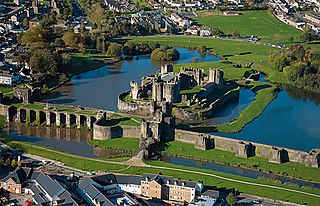
Caerphilly is a town and community in Wales. It is situated at the southern end of the Rhymney Valley.

Caerphilly Castle is a medieval fortification in Caerphilly in South Wales. The castle was constructed by Gilbert de Clare in the 13th century as part of his campaign to maintain control of Glamorgan, and saw extensive fighting between Gilbert, his descendants, and the native Welsh rulers. Surrounded by extensive artificial lakes – considered by historian Allen Brown to be "the most elaborate water defences in all Britain" – it occupies around 30 acres (12 ha) and is the largest castle in Wales and the second-largest castle in the United Kingdom after Windsor Castle. It is famous for having introduced concentric castle defences to Britain and for its large gatehouses. Gilbert began work on the castle in 1268 following his occupation of the north of Glamorgan, with the majority of the construction occurring over the next three years at a considerable cost. The project was opposed by Gilbert's Welsh rival Llywelyn ap Gruffudd, leading to the site being burnt in 1270 and taken over by royal officials in 1271. Despite these interruptions, Gilbert successfully completed the castle and took control of the region. The core of Caerphilly Castle, including the castle's luxurious accommodation, was built on what became a central island, surrounding by several artificial lakes, a design Gilbert probably derived from that at Kenilworth. The dams for these lakes were further fortified, and an island to the west provided additional protection. The concentric rings of walls inspired Edward I's castles in North Wales, and proved what historian Norman Pounds has termed "a turning point in the history of the castle in Britain".

Caerphilly County Borough is a county borough in the south-east of Wales. It is governed by Caerphilly County Borough Council.

The Cornfield is an oil painting by the English artist John Constable, completed from January to March 1826 in the artist’s studio. The painting shows a lane leading from East Bergholt toward Dedham, Essex, and depicts a young shepherd boy drinking from a pool in the heat of summer. The location is along Fen Lane, which the artist knew well. Constable referred to the piece as The Drinking Boy.

Ystrad Mynach is a town in the Caerphilly County Borough, within the ancient county of Glamorgan, Wales, and is 5 mi (8.0 km) north of the town of Caerphilly. The urban area has a population of 19,204, and stands in the Rhymney Valley. Before the Industrial Revolution and the coming of coal mining in the South Wales Coalfield the valley was rural and farmed. It lies in the community of Gelligaer.

Dimple Kapadia is an Indian actress predominantly appearing in Hindi films. Born and raised in Mumbai by wealthy parents, she aspired to become an actress from a young age and received her first opportunity through her father's efforts to launch her in the film industry. She was discovered at age 14 by the filmmaker Raj Kapoor, who cast her in the title role of his teen romance Bobby (1973), which opened to major commercial success and gained her wide public recognition. Shortly before the film's release in 1973, she married the actor Rajesh Khanna and quit acting. Their daughters, Twinkle and Rinke Khanna, both briefly worked as actresses in their youth. Kapadia returned to films in 1984, two years after her separation from Khanna. Her comeback film Saagar, which was released a year later, revived her career. Both Bobby and Saagar won her Filmfare Awards for Best Actress. Through her work over the next decade, she established herself as one of Hindi cinema's leading actresses.

Blackwood is a town, community and an electoral ward on the Sirhowy River in the South Wales Valleys administered as part of Caerphilly County Borough. It is located within the historic county of Monmouthshire.

Gwent Police is a territorial police force in Wales, responsible for policing the local authority areas of Blaenau Gwent, Caerphilly, Monmouthshire, Newport and Torfaen.

Carry On Constable is a 1960 British comedy film, the fourth in the series of 31 Carry On films (1958–1992). It was released in February 1960. Of the regular team, it featured Kenneth Connor, Kenneth Williams, Charles Hawtrey, Joan Sims, and Hattie Jacques. Sid James makes his debut in the series here, while early regulars Leslie Phillips, Eric Barker, and Shirley Eaton also turn up, although Phillips did not appear again in the series for 32 years. It was the first "Carry On..." film to include some nudity with Connor, Hawtrey, Williams, and Phillips baring their behinds during a shower scene. The film was followed by Carry On Regardless 1961.

Pontllanfraith is a large village and community located in the Sirhowy Valley in Caerphilly County Borough, Wales, within the historic boundaries of Monmouthshire. It is situated adjacent to the town of Blackwood, with the Sirhowy River passing through both locations. The village includes the communities of the Penllwyn, Springfield and The Bryn. The population of the community at the 2011 census was 8,552.
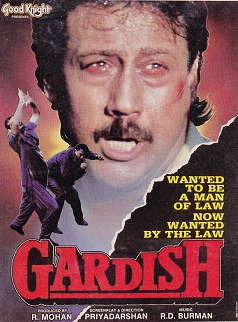
Gardish (transl. Adversity/misfortune) is a 1993 Indian Hindi-language action crime film written and directed by Priyadarshan, starring Shammi Kapoor, Jackie Shroff, Aishwarya, Dimple Kapadia and Amrish Puri. It is a remake of the 1989 Malayalam film Kireedam. The film won two Filmfare Awards—Best Art Direction and Best Action (Thyagarajan), and was nominated for Best Actor (Shroff), Best Supporting Actor, and Best Supporting Actress (Kapadia). It marks the debut of actor Mukesh Rishi as an antagonist and Aishwarya's Bollywood debut.
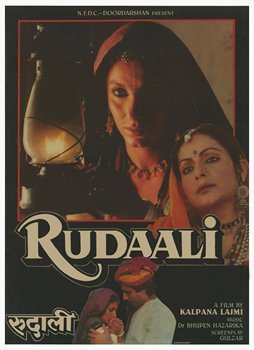
Rudaali is a 1993 Indian Hindi-language drama film directed by Kalpana Lajmi, written by Lajmi and Gulzar and based on a 1979 short story of the same name by Bengali author Mahasweta Devi. Set in a small village in Rajasthan, the film stars Dimple Kapadia as Shanichari, a lonely and hardened woman who, despite a lifetime of misfortune and abandonment, is unable to express grief through crying and is challenged with a new job as a professional mourner. Raakhee, Raj Babbar, and Amjad Khan appear in supporting roles. Produced by the National Film Development Corporation of India and Doordarshan, the film was labelled part of India's neo-realist parallel cinema, but it employed several of the common elements of mainstream Hindi cinema, including songs composed by Bhupen Hazarika.
Events from the year 1817 in the United Kingdom.

Fittleworth is a village and civil parish in the District of Chichester in West Sussex, England located seven kilometres (3 miles) west from Pulborough on the A283 road and three miles (5 km) south east from Petworth. The village has an Anglican church, a primary school and one pub, The Swan. It is within the ancient divisions of the Bury Hundred and the Rape of Arundel. The village is bounded south by the Rother Navigation.
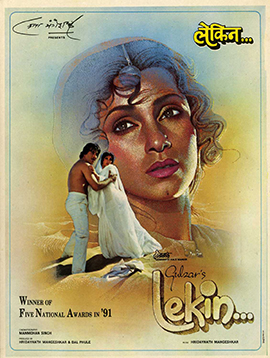
Lekin... (transl. But...) is a 1991 Hindi drama mystery film, loosely based on the 1895 short story Kshudhit Pashaan by Rabindranath Tagore and directed by Gulzar. It stars Vinod Khanna, Dimple Kapadia, Amjad Khan, Alok Nath, and Beena Banerjee, and features a special appearance by Hema Malini. The film tells the story of Reva, a restless ghost who seeks liberation and haunts the ancient palace of Raja Param Singh in Rajasthan when she is discovered by Sameer, a museum curator sent by the government to salvage valuables in the region. As she recreates a visual representation of the history of the palace which reveals her tragic story, Sameer becomes determined to help set her free.
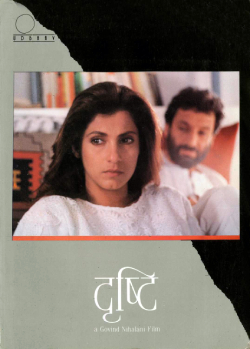
Drishti (transl. Vision) is a 1990 Indian Hindi-language drama film directed by Govind Nihalani, starring Dimple Kapadia, Shekhar Kapur and Irrfan. The film depicts the marital life of an urban couple from an upper-class milieu in Mumbai and follow their trials and tribulations, infidelity, divorce, and meeting after years of separation.

Gelligroes Mill is a water-powered corn mill in Pontllanfraith, Caerphilly county borough, South Wales, designated as a Grade II* listed building in 1962.

Dimple Kapadia is an Indian actress who predominantly appears in Hindi films. She was discovered by Raj Kapoor at age 14, who gave her the title role in his teen romance Bobby (1973), opposite his son Rishi Kapoor. The film became a massive commercial success and made her an overnight star. Her role as a Christian teenager from Goa established her as a youth fashion icon and won her the Filmfare Award for Best Actress. Kapadia retired from acting following her marriage to Indian actor Rajesh Khanna earlier in 1973, and returned to the film industry in 1984, after her separation from Khanna. The release of her comeback film, Saagar, was delayed, with Zakhmi Sher becoming the second film of her career. Released in 1985, Saagar earned her a second Best Actress award at Filmfare, and she went on to establish herself as one of the leading actresses of Hindi cinema in the 1980s and early 1990s. The early roles she played following her return included the Hitchcockian thriller Aitbaar (1985), for which she received positive reviews, and the commercially successful action films Arjun (1985) and Janbaaz (1986). During this period, she acted in several films in South India, which she admitted to having made for financial gain and dismissed their quality.
References
- ↑ Nicol, Gloria (2000). Candles: Making and Displaying. Southwater. p. 159. ISBN 9781842152935.
- ↑ "Candlemaker David Constable on his work by royal appointment". BBC. 11 July 2013. Retrieved 16 May 2020.
- 1 2 "Candles just for Wills and Kate?". Wales Online. 23 December 2010. Retrieved 16 May 2020.
- 1 2 3 4 5 6 "FIRST PERSON: The man who makes candles for Hollywood blockbusters". South Wales Argus. 5 August 2015. Retrieved 16 May 2020.
- ↑ "The Artist, Volume 91". Artist Publishing Corporation. 1976. Retrieved 16 May 2020.
{{cite magazine}}: Cite magazine requires|magazine=(help) - ↑ "While actors of her age play mother, Dimple Kapadia enjoys fresh lease of life". India Today. 18 November 2002. Retrieved 16 May 2020.
- ↑ Google Books, Google.
- ↑ "Candlemaking for Fun & Profit". Prime Home. 2000. p. 303. ISBN 9780761520405.